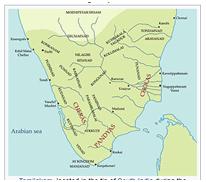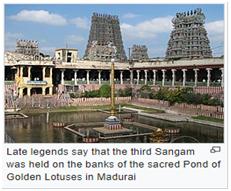Glory, lost and found: Celebrating 120 years of the Fourth Tamil Sangam
- Posted By
10Pointer
- Categories
History & Culture
- Published
31st Dec, 2020
-
Context
- The Fourth Tamil Sangam in Madurai celebrates its 120th anniversary next year.
What is about fourth Tamil Sangam?
- Madurai Tamil Sangam, also known as the fourth Tamil Sangam, is a language academy founded by Prince Paandi Thurai Thevar and other Tamil language scholars to promote the use of Tamil language and Tamil culture in the late 19th century in British held India.
- As there were three Tamil Sangams before, this one was considered to be the fourth one.
- It held exams to confer Tamil Pandithar degree on those who passed.
- Started as SenthamilKalasalai, the Tamil Sangam offered pravesam, balapandidham, pandhidam, vidhwan and pulavar — the successive courses required to become a Tamil pundit.

What are Tamil Sangams?
- The Tamil Sangamswere assemblies of Tamil scholars and poets.
- These assemblies were originally known as koo?amor "gathering.
- Three assemblies are described. The legend has it that the first two were held in cities since "taken by the sea", and the third was held in the present-day city of Madurai.
|
Sangams
|
Time span
|
No. of Poets
|
Kingdom
|
Books
|
|
First
|
4440 years
|
549
|
Pandya
|
No books available
|
|
Second
|
3700 years
|
1700
|
Pandya
|
Tolk?ppiyam
|
|
Third
|
1850 years
|
_____
|
Pandya
|
covers entire Sangam Literature
|

The Sangam period, Sangam Ageor Third Sangam period, is the period of history of ancient Tamil Nadu, Kerala and parts of Sri Lanka.
- It spanned from c. 3rd century BCE to c. 3rd century CE.
- According to Tamil legends, there were three Sangam periods, namely Head Sangam, Middle Sangam and Last Sangam period.
- Historians, use the term Sangam period to refer the last of these, with the first two being legendary.
- So it is also called Last Sangam period or Third Sangam period
- The period between 600 BCE to 300 CE, Tamilakam was ruled by the three Tamil dynasties of Pandya, Chola and Chera, and a few independent chieftains, the Velir.
